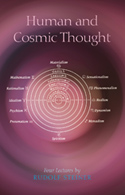
-
HUMAN AND COSMIC THOUGHT
Rudolf Steiner

Rudolf Steiner demonstrates that there are twelve main philosophical standpoints, and that the future of philosophy rests not upon defending one and refuting the others, but in learning to experience the validity of them all.
What convinces us of the truth of a certain point of view? Why do we find it difficult to comprehend viewpoints that differ from our own? What are the inner foundations of our knowledge? In these concentrated and aphoristic lectures, Steiner speaks of twelve main philosophical standpoints, and the importance of understanding each of them. An appreciation of the variety of possible world views not only sharpens and makes more flexible our own powers of thinking, but helps us to overcome a narrow-minded one-sidedness, promoting tolerance of other people and their opinions.
Steiner goes on to explain how each standpoint is also coloured by a particular ‘soul mood’, which influences the way we actively pursue knowledge. Several philosophers and their works are characterised in this manner, throwing light on their contributions to human culture.
Through such insight into the true nature of human thinking, we are led to understand the quality of cosmic thought and how, in Rudolf Steiner’s words, the human being can be seen as a ‘thought which is thought by the Hierarchies of the cosmos’.
4 March 2015; Trans. C. Davy (4 lectures, Berlin, 20-23 Jan. 1914, GA 151); RSP; 72pp; pb;
£9.99 ISBN 9781855844162 - This title is out of print.

